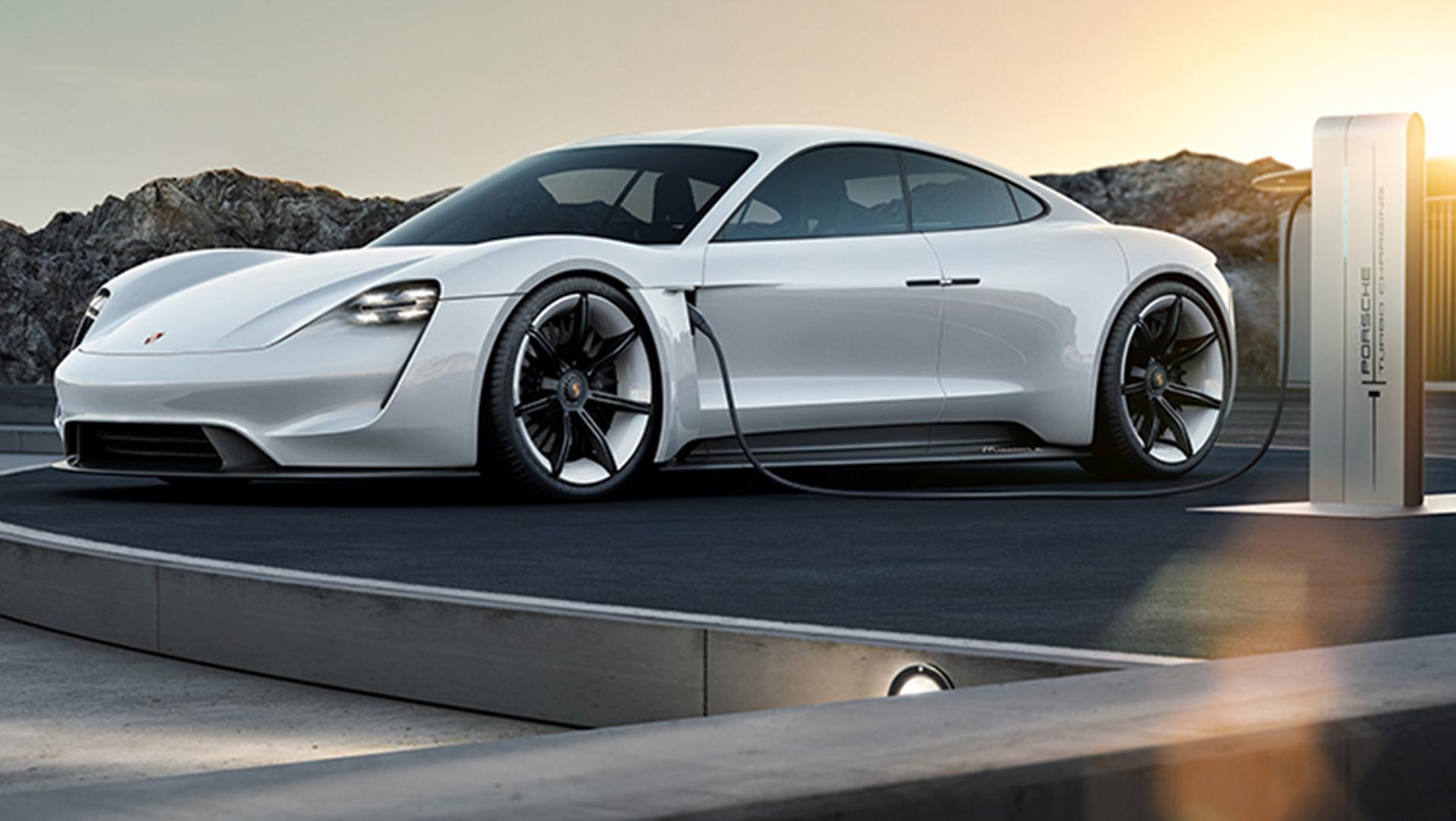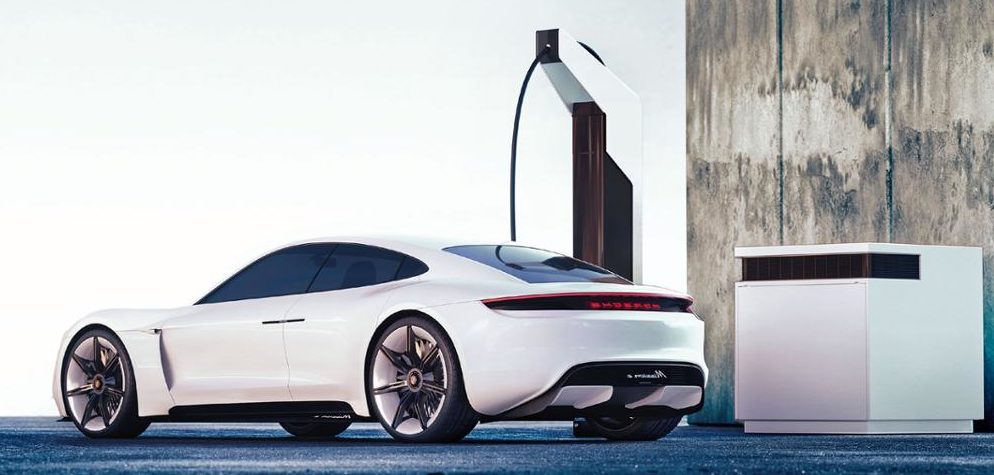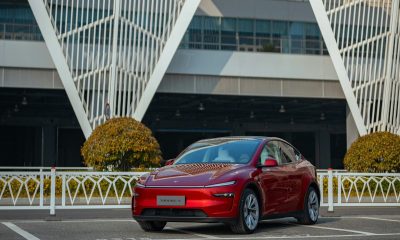

News
Porsche Taycan charging times to be 2X faster than Tesla’s Superchargers
When the Porsche Taycan starts production next year, the electric car market will be even more saturated than it is today. Tesla’s Model 3 would likely be at a production rate of 10,000 units per week. Electric cars from veteran carmakers, such as Jaguar’s I-PACE, Mercedes-Benz’s EQC and Audi’s e-tron, would be in the market as well.
For Porsche, this is not a problem. During the recently held Rennsport Reunion, a gathering of Porsche enthusiasts in Monterey, CA, the German legacy automaker noted that the Taycan would make a mark in the electric car market not because it was the first to enter production. Rather, it would establish itself as a competitor with its driving dynamics and rapid charging times. Detlev von Platen, Porsche’s executive board member for sales and marketing, described the company’s stance on the Taycan in a statement to Fortune.
“We don’t need and don’t want to be the first. It doesn’t make any sense to drive fast and then wait two hours to charge batteries. Achieving an 80% charge in a quarter of an hour is an argument for us.” he said.
Quite unlike the strategy employed by other legacy automakers like Jaguar and Mercedes-Benz, whose vehicles largely rely on established charging infrastructure, Porsche is looking to develop its own charging network. Just like Tesla’s ever-growing Supercharger Network, Porsche’s 350 kW Electric Pit Stops are designed to serve as an ultra-fast charging system for its electric vehicles. Porsche is even taking the idea of fast chargers a step further, stating that it is aiming to design a system that could recharge 80% of the Taycan’s batteries in just 15 minutes.
If Porsche successfully rolls out its Electric Pit Stops, it would create a network of rapid chargers that are twice as quick as Tesla’s Supercharger Network, which have an output of ~120 kW and are capable of recharging the company’s electric vehicles up to 80% in 30 minutes. That said, Tesla is also preparing the rollout of its Supercharger V3, which is expected to have an output of 200-250 kW. During Tesla’s Q1 earnings call, Elon Musk shared a critique of 350 kW systems, stating that such an output could compromise the battery.
“The thing about a 350 kW charger is that it doesn’t actually make a ton of sense, unless you got a monster battery pack or have like a crazy high C rating. We think 350 kW for a single car; you’re gonna frag the battery pack if you do that. You cannot charge a high-energy battery pack at that rate, unless it’s a very high kW battery pack. So, (for us), something along the couple of hundred, 200-250 kW,” Musk said.

Ultimately, Porsche is counting on the strength of its pedigree and the car’s driving performance to push the Taycan forward. The Taycan is Porsche’s first all-electric car, and it would be the flagship of the company as it transitions to an electrified fleet in the coming years. Considering that Porsche has already abandoned diesel and committed to electrifying 50% of its fleet by 2025, the Taycan is a vehicle that must resonate with the company’s loyal consumer base. Michael Steiner, Porsche research and development executive board member, believes that the Taycan will be up to the task.
“Even if you’re not looking for an EV, I’m convinced there will be a lot of customers driving it for performance,” he said.
Porsche is already seeing encouraging signs from its customers. Executives of the legacy automaker note that the demand for its green vehicles is increasing. In Europe, for example, plug-in hybrid variants of the Porsche Panamera already comprise 60% of the vehicle’s sales. Porsche is aiming to produce 20,000 units of the Taycan every year, and so far, the reception of the vehicle has been better than expected. In Norway alone, 2,000 reservations have been filed for the car. Pre-orders for the Taycan have started in the United States as well.
Elon Musk
Tesla reveals it is using AI to make factories more sustainable: here’s how
Tesla is using AI in its Gigafactory Nevada factory to improve HVAC efficiency.

Tesla has revealed in its Extended Impact Report for 2024 that it is using Artificial Intelligence (AI) to enable its factories to be more sustainable. One example it used was its achievement of managing “the majority of the HVAC infrastructure at Gigafactory Nevada is now AI-controlled” last year.
In a commitment to becoming more efficient and making its production as eco-friendly as possible, Tesla has been working for years to find solutions to reduce energy consumption in its factories.
For example, in 2023, Tesla implemented optimization controls in the plastics and paint shops located at Gigafactory Texas, which increased the efficiency of natural gas consumption. Tesla plans to phase out natural gas use across its factories eventually, but for now, it prioritizes work to reduce emissions from that energy source specifically.
It also uses Hygrometric Control Logic for Air Handling Units at Giafactory Berlin, resulting in 17,000 MWh in energy savings each year. At Gigafactory Nevada, Tesla saves 9.5 GWh of energy through the use of N-Methylpyrrolidone refineries when extracting critical raw material.
Perhaps the most interesting way Tesla is conserving energy is through the use of AI at Gigafactory Nevada, as it describes its use of AI to reduce energy demand:
“In 2023, AI Control for HVAC was expanded from Nevada and Texas to now include our Berlin-Brandenburg and Fremont factories. AI Control policy enables HVAC systems within each factory to work together to process sensor data, model factory dynamics, and apply control actions that safely minimize the energy required to support production. In 2024, this system achieved two milestones: the majority of HVAC infrastructure at Gigafactory Nevada is now AI-controlled, reducing fan and thermal energy demand; and the AI algorithm was extended to manage entire chiller plants, creating a closed-loop control system that optimizes both chilled water consumption and the energy required for its generation, all while maintaining factory conditions.”
Tesla utilizes AI Control “primarily on systems that heat or cool critical factory production spaces and equipment.” AI Control communicates with the preexisting standard control logic of each system, and any issues can be resolved by quickly reverting back to standard control. There were none in 2024.
Tesla says that it is utilizing AI to drive impact at its factories, and it has proven to be a valuable tool in reducing energy consumption at one of its facilities.
Elon Musk
Tesla analysts believe Musk and Trump feud will pass
Tesla CEO Elon Musk and U.S. President Donald Trump’s feud shall pass, several bulls say.

Tesla analysts are breaking down the current feud between CEO Elon Musk and U.S. President Donald Trump, as the two continue to disagree on the “Big Beautiful Bill” and its impact on the country’s national debt.
Musk, who headed the Department of Government Efficiency (DOGE) under the Trump Administration, left his post in May. Soon thereafter, he and President Trump entered a very public and verbal disagreement, where things turned sour. They reconciled to an extent, and things seemed to be in the past.
However, the second disagreement between the two started on Monday, as Musk continued to push back on the “Big Beautiful Bill” that the Trump administration is attempting to sign into law. It would, by Musk’s estimation, increase spending and reverse the work DOGE did to trim the deficit.
Every member of Congress who campaigned on reducing government spending and then immediately voted for the biggest debt increase in history should hang their head in shame!
And they will lose their primary next year if it is the last thing I do on this Earth.
— Elon Musk (@elonmusk) June 30, 2025
President Trump has hinted that DOGE could be “the monster” that “eats Elon,” threatening to end the subsidies that SpaceX and Tesla receive. Musk has not been opposed to ending government subsidies for companies, including his own, as long as they are all abolished.
How Tesla could benefit from the ‘Big Beautiful Bill’ that axes EV subsidies
Despite this contentious back-and-forth between the two, analysts are sharing their opinions now, and a few of the more bullish Tesla observers are convinced that this feud will pass, Trump and Musk will resolve their differences as they have before, and things will return to normal.
ARK Invest’s Cathie Wood said this morning that the feud between Musk and Trump is another example of “this too shall pass:”
BREAKING: CATHIE WOOD SAYS — ELON AND TRUMP FEUD “WILL PASS” 👀 $TSLA
She remains bullish ! pic.twitter.com/w5rW2gfCkx
— TheSonOfWalkley (@TheSonOfWalkley) July 1, 2025
Additionally, Wedbush’s Dan Ives, in a note to investors this morning, said that the situation “will settle:”
“We believe this situation will settle and at the end of the day Musk needs Trump and Trump needs Musk given the AI Arms Race going on between the US and China. The jabs between Musk and Trump will continue as the Budget rolls through Congress but Tesla investors want Musk to focus on driving Tesla and stop this political angle…which has turned into a life of its own in a roller coaster ride since the November elections.”
Tesla shares are down about 5 percent at 3:10 p.m. on the East Coast.
Elon Musk
Tesla scrambles after Musk sidekick exit, CEO takes over sales
Tesla CEO Elon Musk is reportedly overseeing sales in North America and Europe, Bloomberg reports.

Tesla scrambled its executives around following the exit of CEO Elon Musk’s sidekick last week, Omead Afshar. Afshar was relieved of his duties as Head of Sales for both North America and Europe.
Bloomberg is reporting that Musk is now overseeing both regions for sales, according to sources familiar with the matter. Afshar left the company last week, likely due to slow sales in both markets, ending a seven-year term with the electric automaker.
Tesla’s Omead Afshar, known as Elon Musk’s right-hand man, leaves company: reports
Afshar was promoted to the role late last year as Musk was becoming more involved in the road to the White House with President Donald Trump.
Afshar, whose LinkedIn account stated he was working within the “Office of the CEO,” was known as Musk’s right-hand man for years.
Additionally, Tom Zhu, currently the Senior Vice President of Automotive at Tesla, will oversee sales in Asia, according to the report.
It is a scramble by Tesla to get the company’s proven executives over the pain points the automaker has found halfway through the year. Sales are looking to be close to the 1.8 million vehicles the company delivered in both of the past two years.
Tesla is pivoting to pay more attention to the struggling automotive sales that it has felt over the past six months. Although it is still performing well and is the best-selling EV maker by a long way, it is struggling to find growth despite redesigning its vehicles and launching new tech and improvements within them.
The company is also looking to focus more on its deployment of autonomous tech, especially as it recently launched its Robotaxi platform in Austin just over a week ago.
However, while this is the long-term catalyst for Tesla, sales still need some work, and it appears the company’s strategy is to put its biggest guns on its biggest problems.
-

 Elon Musk2 days ago
Elon Musk2 days agoTesla investors will be shocked by Jim Cramer’s latest assessment
-

 News7 days ago
News7 days agoTesla Robotaxi’s biggest challenge seems to be this one thing
-

 News2 weeks ago
News2 weeks agoTesla’s Grok integration will be more realistic with this cool feature
-

 Elon Musk2 weeks ago
Elon Musk2 weeks agoElon Musk slams Bloomberg’s shocking xAI cash burn claims
-

 News2 weeks ago
News2 weeks agoTesla China roars back with highest vehicle registrations this Q2 so far
-

 News2 weeks ago
News2 weeks agoTexas lawmakers urge Tesla to delay Austin robotaxi launch to September
-

 News2 weeks ago
News2 weeks agoTesla dominates Cars.com’s Made in America Index with clean sweep
-

 Elon Musk1 week ago
Elon Musk1 week agoFirst Look at Tesla’s Robotaxi App: features, design, and more















